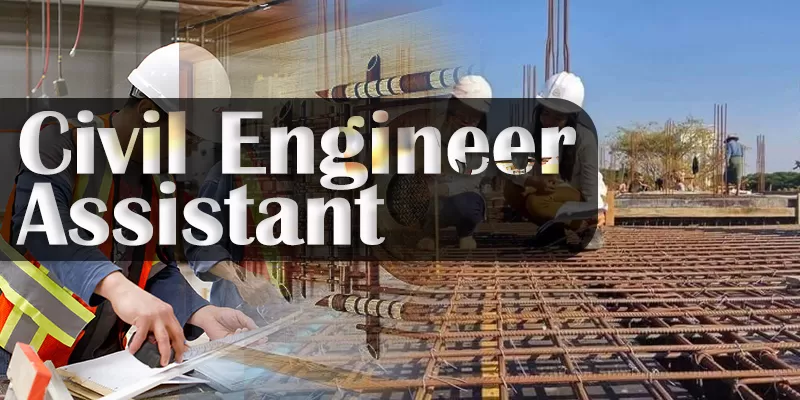
ITI Trade: Civil Engineer Assistant (Powered by NCVT)
The Civil Engineer Assistant trade is a job-oriented course under NCVT (National Council for Vocational Training). This trade is specifically designed to meet the industrial demands of both Indian and international construction sectors. The course equips trainees with the essential technical skills required in civil engineering, focusing on construction, maintenance, and supervision of various infrastructure projects.
The Civil Engineer Assistant trade offers promising career opportunities in government, private, and industrial sectors. It also empowers candidates for self-employment in the civil construction industry.
Course Overview
A Civil Engineer Assistant supervises the construction of buildings, roads, canals, and other civil infrastructure as per approved drawings and specifications. They are involved in site inspections, layout marking, contour surveys, levelling, material testing, and quality control. Under the guidance of an Engineer in Charge, they ensure the progress and quality of construction activities, maintain records, and oversee the use of materials, labor, and equipment.
Scope of Employment
Upon successful completion of this course, candidates are well-equipped for:
- Civil Engineering Technician roles
- Overseer / Supervisor positions in civil projects
- Contractual or industrial employment
- Self-employment in construction and infrastructure development
Course Summary and Skills Acquired
Drawing and Drafting Skills
- Understand safe working practices, environmental regulations, and housekeeping.
- Create free-hand sketches of civil hand tools and drawing sheet layouts.
- Use drawing instruments to draft symbols, lettering, numbering, plane figures, and apply BIS standards.
- Construct plain, comparative, diagonal, and vernier scales.
- Draw orthographic projections, isometric, oblique, and perspective views.
- Draft component parts of single-storey residential buildings with CAD software.
- Generate 2D and 3D models in CAD, ArchiCAD, and 3ds Max for architectural and civil designs.
Surveying and Site Layout
- Perform chain, tape, prismatic compass, and plane table surveys.
- Prepare contour maps and topographical plans using levelling instruments.
- Conduct site surveys with Theodolite and Total Station.
- Mark layouts for different types of foundations and structures.
Building Construction Techniques
- Identify and test building materials: stone, brick, cement, sand, lime, etc.
- Execute brick masonry work in different bonds (English, Flemish, header, stretcher).
- Apply plastering, pointing, rendering, and wall cladding techniques.
- Demonstrate Damp Proof Course (DPC) installation.
- Construct various types of flooring and roofing.
- Build wooden doors, windows, frames, and fix components.
- Fabricate wooden joints and small furniture items.
Plumbing and Sanitary Work
- Perform pipe cutting, joining, and simple plumbing installations.
- Lay soil and waste pipes, and install sanitary fittings in residential buildings.
- Execute house plumbing and drainage layouts.
- Repair service mains and sanitary installations.
- Apply adhesives for tile fixing, concrete jointing, and sealing.
Electrical Work
- Join and solder electrical wires, and perform crimping.
- Install electrical wiring, accessories, and appliances following ISI standards.
- Install earthing systems, MCBs, fuses, lamps, and fixtures.
- Identify and test transformers.
- Estimate costs for electrical installations.
Concrete and Reinforcement Work
- Test and analyze cement, aggregates, sand, and water-cement ratios.
- Prepare and place concrete, and execute formwork and reinforcement.
- Reinforce RCC members like beams, columns, slabs, retaining walls.
- Erect scaffolding and intricate formwork.
- Prepare bar bending schedules and calculate material quantities.
Advanced Civil Works
- Construct arches, lintels, chajjas, and staircases.
- Demonstrate pile foundation techniques.
- Understand different types of vertical transportation: stairs, lifts, ramps, escalators.
- Perform anti-termite treatment and market surveys for related materials.
- Operate construction equipment: excavation, hoisting, conveying, drilling machinery.
Construction Management and Estimation
- Manage manpower, materials, and machinery for effective project execution.
- Conduct rate analysis of work items with detailed specifications.
- Prepare detailed estimates for single-room buildings using center line and separate wall methods.
- Calculate quantities and abstract costs for civil works.
- Perform repair and maintenance tasks: plastering, whitewashing, flooring, painting, glass replacement, etc.
Field Training and Practical Applications
- Troubleshoot foundation failures and strengthen foundations.
- Repair leaking roofs, expansion joints, and damaged structures.
- Layout house plumbing and drainage systems.
- Conduct field training on advanced construction equipment and safety procedures.
Software Skills
- Create 2D and 3D civil designs using CAD, ArchiCAD, Revit, and 3ds Max.
- Model architectural elements and prepare presentation drawings.
Project Work and Final Examination
The course concludes with project work, revisions, and comprehensive assessments to ensure practical understanding and job readiness.
Course Highlights
- Eligibility: 10th Pass
- Duration: 2 Years
- Certification: NCVT
- Employment Areas: Government departments, private construction firms, contractors, consultancies, and self-employment opportunities.
